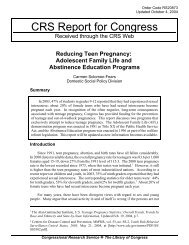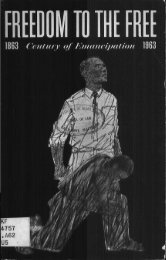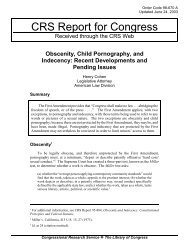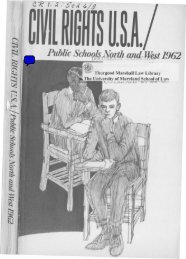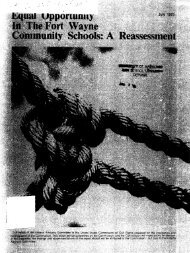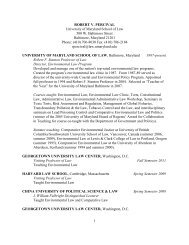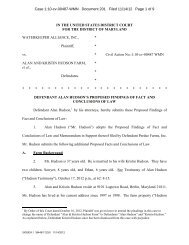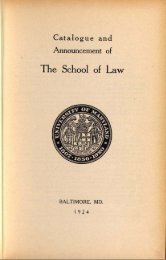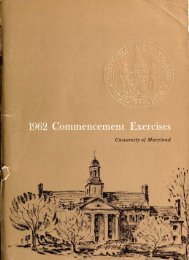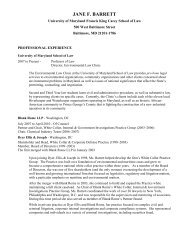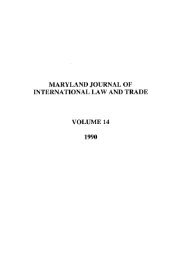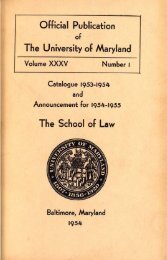University of Maryland School of Law : Catalog, 1988-1989
University of Maryland School of Law : Catalog, 1988-1989
University of Maryland School of Law : Catalog, 1988-1989
You also want an ePaper? Increase the reach of your titles
YUMPU automatically turns print PDFs into web optimized ePapers that Google loves.
Future Interests (3)<br />
This course is a study <strong>of</strong> future interests<br />
with special emphasis on<br />
the nature and characteristics <strong>of</strong><br />
such interests, and their creation<br />
and use in the drafting <strong>of</strong> wills and<br />
trusts. A consideration <strong>of</strong> such topics<br />
as reversions, remainders, executory<br />
interests, possibilities <strong>of</strong> reverter,<br />
powers <strong>of</strong> termination,<br />
powers <strong>of</strong> appointment, problems<br />
<strong>of</strong> construction, the rule against<br />
perpetuities and problems in fiduciary<br />
administration is included.<br />
P: Estates and Trusts.<br />
Day (LAW 508 C)—Mrs. Brumbaugh.<br />
Government Contracts (2)<br />
The course deals with the specialized<br />
rules and dispute resolution<br />
procedures <strong>of</strong> federal government<br />
contracts which in many cases depart<br />
significantly from the patterns<br />
<strong>of</strong> the common law and the<br />
U.C.C. The course will afford students<br />
a second, and deeper, look at<br />
some <strong>of</strong> the same problems they<br />
encountered in first-year contracts<br />
and in commercial law as examined<br />
through the perspective <strong>of</strong> an<br />
alternative regulatory scheme. By<br />
comparing and contrasting the<br />
common law and statutory rules<br />
governing private contracts with<br />
the regulatory scheme governing<br />
public contracts, students will be<br />
in a position to make intelligent<br />
and informed judgments as to what<br />
approach may be preferable as a<br />
matter <strong>of</strong> policy.<br />
Day/Evening (LAW 564 C) at<br />
5:25 p.m.—Mr. Breitowitz.<br />
Health Care <strong>Law</strong> (2)<br />
This course examines the American<br />
health care system and focuses<br />
on issues not studied in any detail<br />
in the <strong>Law</strong> and Medicine course.<br />
Such issues to be explored may include<br />
the organization and regulation<br />
<strong>of</strong> health care institutions;<br />
quality control and peer review organizations;<br />
the emerging role <strong>of</strong><br />
alternative delivery settings; cost<br />
containment; health planning and<br />
certificate <strong>of</strong> need; utilization review;<br />
Medicare and Medicaid;<br />
health insurance; access to health<br />
care; and antitrust and health care.<br />
Day (LAW 516 D)— Ms. Rot/ienberg.<br />
Idea <strong>of</strong> <strong>Law</strong> in Western<br />
Culture Seminar* (3)<br />
This seminar will explore the concept<br />
<strong>of</strong> law in the tradition <strong>of</strong> the<br />
West through readings and discussions<br />
<strong>of</strong> the works <strong>of</strong> the great contributors<br />
to that tradition:<br />
Aeschylus, Plato, Aristotle, Plutarch,<br />
Aquinas, Shakespeare,<br />
Montesquieu, Kant, Hegel, Dostoevski<br />
and others. The goals <strong>of</strong><br />
the seminar are to develop the<br />
skills <strong>of</strong> careful and critical reading<br />
and listening, to provide a context<br />
for cooperative learning, in which<br />
each participant assists the others<br />
in increasing mutual understanding<br />
<strong>of</strong> difficult and important material.<br />
In lieu <strong>of</strong> the traditional long research<br />
paper, students will be expected<br />
to write a number (3-5) <strong>of</strong><br />
short original (i.e., nonresearch)<br />
essays demonstrating that they have<br />
grappled with the problems <strong>of</strong> the<br />
seminar. Hence, papers prepared<br />
for the seminar will not be eligible<br />
for certification as satisfying the<br />
writing requirement for graduation.<br />
The seminar satisfies the perspective<br />
requirement.<br />
Day (LAW 550 D) Summer,<br />
<strong>1988</strong>—Mr. Hornstein.<br />
Immigration <strong>Law</strong> (2)<br />
This course <strong>of</strong>fers a study <strong>of</strong> immigration<br />
law and policy, the rights<br />
<strong>of</strong> aliens and the role <strong>of</strong> the judiciary.<br />
The course will examine the<br />
powers <strong>of</strong> the sovereign, the administration<br />
and enforcement <strong>of</strong><br />
the immigration laws by the executive<br />
agencies, the constitutional<br />
limitations on the power to exclude<br />
aliens and those areas <strong>of</strong> the law<br />
where the judiciary has intervened.<br />
P: Constitutional <strong>Law</strong>.<br />
Evening (LAW 551 H)— Ms.<br />
Vaughns.<br />
Income Taxation (3)<br />
Students learn the fundamentals <strong>of</strong><br />
federal income taxation, with emphasis<br />
on the ways in which the<br />
tax law develops through the interaction<br />
<strong>of</strong> congressional policy, administrative<br />
interpretation and judicial<br />
decision. After a brief<br />
examination <strong>of</strong> federal tax procedure,<br />
the course covers such basic<br />
concepts as the nature <strong>of</strong> income,<br />
deductions, accounting for the taxable<br />
year and capital gains.<br />
Day (LAW 506 B)— Mr. D. Goldberg,<br />
Mr. Keller; Evening (LAW 506<br />
G)— Mr. D. Goldberg.<br />
79



